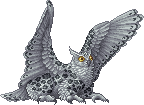Viewing tfEdu

Father: Unknown
Unknown Pedigree
Hardiness: 9
Appearance: 3
Emerged: 17:13 10.01.2022
Matured: 3:17 13.01.2022
With its keen eyesight and hearing, the Lanuga Vizago is unparalleled in its niche as a stealth hunter. This diurnal raptor hunts by perching motionless as it waits for a rodent or large insect to pass by. When it spots potential prey, it swoops down silently and stalks them from a distance before pouncing with its mighty talons. Lanuga Vizagos are especially fond of Brila Ornamos; although these insects provide little in the way of nutrition, their colorful rounded carapaces serve as endless entertainment for a Lanuga Vizago to bat around and chase after. Despite their sharp predatory instincts, Lanuga Vizagos possess a rather low level of intelligence. If one feels overwhelmed by its surroundings, it may sit down and stare into the distance until coaxed back into action with food or the motion of a small animal or toy. They prefer to spend their days lazily napping and grooming their soft feathers, but those raised in a laboratory environment should be allowed to roam free whenever possible. Lanuga Vizagos require copious amounts of playtime and socialization lest they fall into fits of prolonged yowling or spiteful disobedience.
The creatures that dwell in this rather desolate world still display some diversity in appearance, eating habits, and social behavior. Whether they have fur or feathers, skin or scales, their unique genetic makeup allows for a variety of colors and markings within each species. Despite limitations in food sources, herbivores, omnivores, and carnivores are all present in the food chain, and each species requires specialized care within a laboratory. Although the artificial setting of housing units and breeding pods precludes most opportunities to study true interspecific behavior, the interactions within and between species has been studied extensively in the wilderness by scientists daring enough to venture beyond the outpost’s walls.
